
Running a small caravan site, I get to see a wide range of different cars towing a caravan every year. In some cases, those vehicles will be relatively new, in other cases, they can be pretty old. Its not uncommon to see a 30-year-old Toyota Landcruiser towing a caravan onto Horton Common. Organisations such as The Caravan Club and The Camping and Caravanning Club run annual tow car awards which I will link to below. I think those new tow car awards are worth a look at, but what if you are purchasing a second-hand/used tow car? Furthermore, I don’t feel they put enough emphasis to actually explain what actually makes some cars the best/better option for towing a caravan.
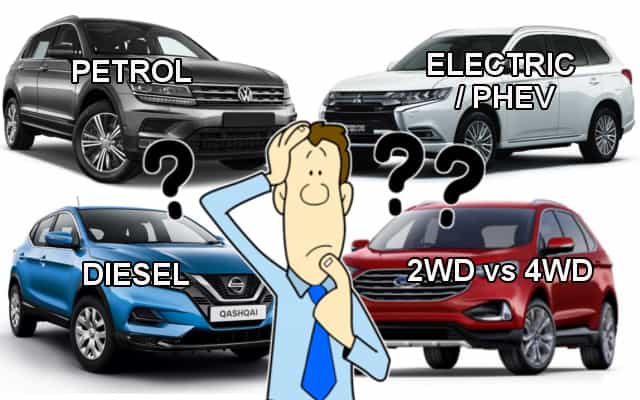
The information below, which I’ve put together, is a collection of my own thoughts and feedback from our guests here at Horton Common.
I wanted to discuss a significant range of towing topics, such as choosing a diesel, petrol or as we advance, an electric tow car.
I’ll also discuss the different tow bar options you need to consider, along with comments on the 2WD vs 4WD debate.
My objective is not to direct you to a specific car and state that will be the best option for towing your caravan.
My aim is to provide you with the skills to determine which body type, fuel type, drive system and general tow car size is going to best suit your needs.
As this is quite a long post, feel free to use the Table of Contents below to jump to specific sections.
Disclaimer: Hey! By the way… any links on this page that lead to products on Amazon or Caravan Guard are affiliate links, and I earn a commission if you make a purchase, with no additional cost to you 🙂
- Dissolves waste and removes odours naturally and has delightful mild fragrance
Want To Visit Horton Common? – Book Here
Table of Contents
Introduction To The Best Cars For Towing A Caravan
Since we have been running Horton Common caravan site since 2014, each year, we have a range of new guests and returning guests.
Furthermore, due to our fully serviced pitches, we also attract quite a few new beginner caravanners.
Therefore, I’ve had a lot of discussions over the years about tow cars and what are the best cars for towing a caravan.
For instance, I’ll sometimes have a new caravanner arrive on-site with a car that is undersized/underpowered for their particular caravan.
However, some of the most interesting conversations I have about tow cars are with our returning guests when they change their tow car.
Those conversations range from guests singing the praises of their new tow car to being thoroughly disappointed.

Diesel tow cars are being phased out due to the ongoing repercussions of ‘diesel gate‘.
Therefore, these changes, in some cases, are not leading to better tow cars, causing disappointment from some.
However, purchasing a used/second-hand heavy diesel tow car may also create complications. More city centres over the coming years are going to be adopting ‘clean air zones‘.
Therefore, going forward there are going to be more places where diesel vehicles will be banned.
So now more than ever it can be a very tricky time to purchase a tow car, new or old which is best going to suit your needs
Annual Awards For The Best Cars For Towing A Caravan
While I run a popular caravan site, and I believe I know quite a bit about what features make up the best tow cars, I’m by no means an expert.
To be honest, when anyone refers to themselves as an ‘expert’ at anything I find it a bit odd. I just think at a specific point in time some people have more knowledge and experience than others.
However, everyone, even those with a lot of experience and knowledge, should still be on a journey to experience and learn more, as things change.
With that in mind, I would never suggest that anyone should read this post on which features I believe make up the best tow cars as their only source of information.
Therefore I’ve provided links/videos below to the annual tow car awards from different organisations:
The Caravan And Motorhome Club Tow Car Of The Year Awards
Typically every year The Caravan and Motorhome Club will individually test over 30 tow car options available from a wide range of manufacturers at the Millbrook Proving Ground.
With a range of ‘industry experts’, they test various features and abilities of cars with regard to acceleration, braking, hill starts, reversing and traction.
Below is an example video of the tow car of the year awards:
What Makes A Car Best Suited For Towing A Caravan?
After watching the two videos above of the various annual tow car awards, you will already have a general idea of what features make up the best tow cars.
First off is the weight match, the general ‘rule’ is an 85% kerb weight car/caravan match.
In other words, you generally want the kerb weight of the tow car to be 15% more than the caravan at its fully laden weight. This will help to aid in stable towing, along with a caravan stabiliser.
Hence, if the car is heavier than the caravan, you are less likely to get the tail (caravan) wagging the dog (tow car) while on the road.
Now, I’ve written lots of posts already around this subject, so I’m going to provide links to them below to save me from repeating myself:
- How much does a caravan weigh?
- Caravan User Payloads
- How to load up and pack your caravan safely and legally
A Diesel, Petrol or … an Electric Tow Car?
My objective with this post to help you find the best tow car to suit your needs is to provide a broad overview of the features/specifications you need to consider than to simply list cars.
Now from the early 2000’s up to the ‘diesel gate’ scandal in 2015, you would find most people simply stating a diesel tow car will be your best option.
And that really was the case, for instance, we have a mid-2000s diesel Nissan X-Trail and its a great tow car for our caravan.
However, I personally wouldn’t buy a diesel today for a couple of reasons discussed below.
Not only due to the diesel emissions issue but due to the fact, there are now better petrol tow car options to consider with cars produced from around 2015 onwards.
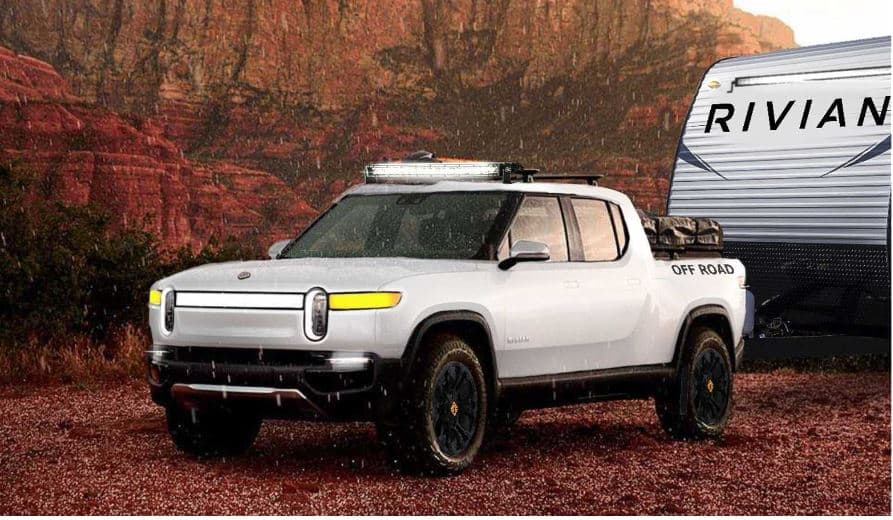
With regards to electric tow cars, I have a separate post on that subject which you can read through the associated link.
I’m not going to discuss pure electric tow cars in this post for a couple of reasons, but I will reference battery/electric motor-assisted petrol tow cars (hybrids).
Currently, and for at least the next couple of years, there is not a sufficient range of pure electric cars that can actually tow a caravan.
Furthermore, the price range of these vehicles is out of most people’s budgets. There are also current limitations on charging infrastructure and towing range etc.
I discuss all of those points in the link above. However, make no mistake, electric tow cars are coming, and ultimately they will be a superior option to both diesel and petrol tow cars in every regard.
Comparing Diesel vs Petrol Cars For Towing A Caravan
As stated above, for many years, if you owned a caravan and you were looking to get a tow car, you bought a diesel. After all, the Government told us diesel cars were better for the environment!
Therefore, the road tax on diesel cars was cheaper based on their lower carbon dioxide emissions compared to petrol.
Diesel actually used to be cheaper than petrol, and diesel engines returned a better MPG (Miles per Gallon), hence win-win!
When it comes to towing a caravan, typically, you are going to have more low-end torque from a diesel engine compared to a petrol engine.
Hence, pulling away and accelerating from a diesel engine when towing a caravan was better. However, petrol cars for towing a caravan have come a long way and continue to improve.
For instance, the video below is of Practical Caravan comparing diesel and petrol VW Tiguans when towing a caravan.
Modern petrol engines have much better turbochargers/superchargers to provide petrol cars even with small engines with more torque.
Furthermore, modern automatic transmissions have come a long way, and are much better at getting torque to the wheels.
When purchasing a car for towing a caravan, its best to focus on the toque figure (lb-ft or Nm) over the horsepower figure (hp).
Torque is also commonly referred to as ‘pulling power’. Therefore, for acceleration with a caravan in tow, the more torque, the better.
This is why in the future when electric tow cars are more available/cheaper, they will be the best tow cars, as they have significantly more torque than most petrol or diesel cars.
Now in the Practical Caravan video above, the diesel VW Tiguan was their choice, but they did state it was a close call.
The likely reason they are still opting for diesel over petrol is the difference in MPG. The VW Tiguan returned around 20 MPG when towing a caravan compared to the diesel’s 30 MPG.
Therefore, even though diesel is currently more expensive to purchase than petrol, the upfront running costs are likely to be lower.
Personally, going forward, even with the lower MPG, I would still choose a new petrol tow car for a couple of reasons.
Modern Diesel Engines In Tow Cars Are Compromised
Back in the 2000s and earlier, diesel engines were relatively simple beasts compared to today’s modern diesel engines.
They had fewer, if any, of the modern emissions features which are mandatory on diesel engines produced today.
After the VW Dieselgate scandal, it was clear that diesel engines were producing more nitrous oxide (NOx) and particulate (carbon dust) emissions than regulators were led to believe.
Now, to be fair to VW, they were not the only car manufacturer caught producing misleading results on the emissions test.
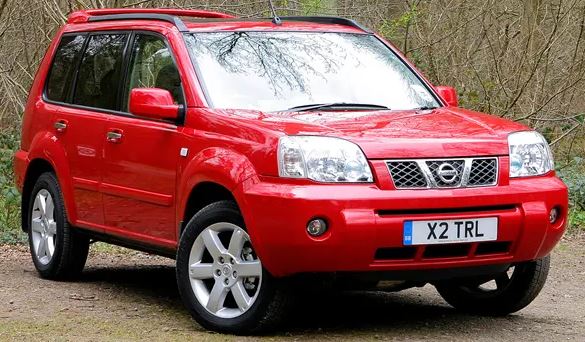
The reason that VW cheated on the emissions tests was to get the performance and reliability from the engines they needed to market the benefits of ‘clean diesel’.
To actually get diesel engines to comply with emissions regulations, the emissions control systems have to be more strict.
Hence, letting less nitrous oxide and particulates escape from diesel cars. To do this, more advanced/strict diesel particulate filters (DFPs) are now installed, along with more strict catalytic converters to deal with the NOx emissions.
More diesel cars are now also required to top up with Adblue to reduce their NOx emissions.
Furthermore, the fuel injection systems now have smaller holes to burn the diesel more efficiently. All sounds good, yes, problem solved! Well, not quite.
Diesel Engines Don’t Like Short Journies, Especially Modern Diesel Engines
No old or new diesel engine is ideally suited for short journeys of less than 30 miles. There is a couple of reasons for this, but I don’t want to turn this post into a science lesson and bore everyone.
Essentially though, to burn diesel as efficiently as possible and to create as few particulate deposits as possible, diesel engines need long runs. Don’t just take my word for it:
“The long and short of the issue is, you must regularly run a diesel engine at high speeds for between 30 and 50 minutes to allow the exhaust temperature to increase enough to cleanly ‘burn off’ the excess soot in the filter and clear it – motorway driving is ideal for this. Meaning for shorter journeys like to and from the shops, driving about town or if you have a shorter or slower-paced commute, a petrol engine will be more suitable.” : Quote – RAC.co.uk
As earlier diesel engines didn’t fit diesel particulate filters, this was less of an issue for the vehicle owner. Sure, you’ll see a black plume of particulate dust come out of the back of the car and feel guilty.
Well, at least we do, hence why we now have an electric car for short runs and just use the diesel for towing.
However, on modern diesel engines, those particulates are captured. Better for the environment, yes, however it eventually leads to problems.
DPF filters become blocked and frequently blocked in cases where the cars are used frequently for short runs.
There are cases of dodgy garages offering to drill holes in DPF filters to keep cars running. Though this is actually illegal and an MOT failure.
Clean Air Zones – Diesel Tow Cars Are More Prone To Charges & Bans
Essentially moving forward, there are going to be more and more places around the UK where diesel tow cars will not be allowed to enter without paying an additional fee at least.
Originally the Clean Air Zone proposals were thought to only apply to commercial vehicles and public transport.
However, after the Government was legally challenged, local authorities can also ban/charge private vehicles. Hence diesel cars towing caravans will be affected.
Now currently, the Clean Air Zones will only apply to major city centres, an unlikely place to be towing a caravan. However, Clean Air Zones will be rolled out to smaller cities and towns in the future.
Using the map above, if you have a look at Bristol, you will see that they are planning a total diesel vehicle ban, not simply adding additional charges.
This is going to be particularly challenging for Bailey caravans who are located very close to the Bristol city centre.
Conclusion: I Don’t Think A Diesel Tow Car Is The Best Option Going Forward
On the whole, my personal opinion on whether to choose a petrol or diesel tow car for your caravan, I would opt for petrol.
The reason is, most people don’t use their tow car just for towing their caravan. For most people, their tow car is their main car in general.
Hence, it gets used for short runs, which diesel engines really do not like.
If you were to use a diesel tow car purely for towing a caravan, hence it would mainly be used for long runs there would less potential issues with blocking the diesel particulate filter etc.
However, with diesel engines, in general, going forward, you are also more likely to have issues with charges/bans going into Clean Air Zones.
Hence, while diesel engines still return higher MPG figures than petrol cars when towing, that’s obviously only part of the cost equation.
You need to appreciate the potential additional servicing/repair costs for diesel engines due to blocked particulate filters etc.
Furthermore, you have to factor in the potential additional costs of entering Clean Air Zones. In some cases, such as Bristol, you may even be banned from entering with a diesel car.
Therefore, as a general conclusion, going forward until pure electric tow cars are a viable option, I would opt for a petrol tow car.
Its also worth noting more petrol/hybrids are entering the market with improved MPGs and with additional torque from their electric motors.
The 2WD vs 4WD (4×4) Tow Car Debate For Towing a Caravan
I’ve had discussions with guests quite a few times over the years about 2WD vs 4WD tow cars. I have a post on 2WD vs 4WD where I go into quite a bit of detail on the topic.
Here, I’ll just generalise the points/arguments I make in that post.
Typically, I’ll have a guest who is considering changing their 2WD tow car, and they are trying to decide if they should go for 4WD.
The appeal is the additional traction for towing their caravan as well as better winter driving performance. But that’s not always the case, as the video below shows:
As I discuss in my post linked above, there are actually a lot of different 4WD and AWD systems fitted to cars.
Some are more capable than others. Its a balance between choosing a tow car that will provide more traction but not be too inefficient. In other words, the most capable 4WD tow cars will typically return the worst MPG figures.
However, as I discuss in that post and my post on the best tyres for tow cars, you should be investing in better tyres first and foremost.
A 2WD car with good tyres can actually get better traction than a 4WD tow car with budget tyres, as the video above shows.
Saloons vs Estates vs Hatchback Tow Cars
Ok, so above, I’ve discussed the different tow car fuel options and drive systems. What about the actual size and shape of the tow car itself?
What car body shape/style is generally going to best suit most people?
A common comment I’ve heard from many new caravanners is they were surprised by how much ‘stuff’ they have to take with them.
Now, this obviously varies between couples and families, but generally, yes, you need to be prepared to take a lot of ‘stuff’ with you.
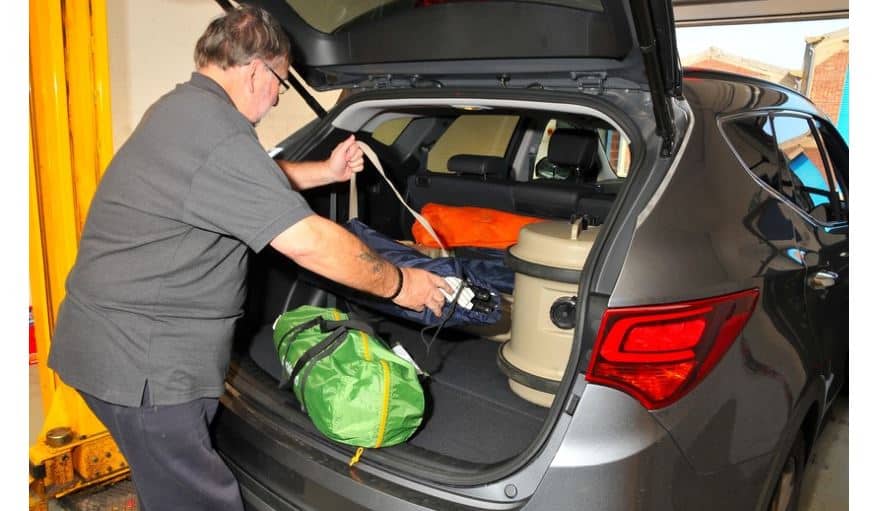
In many cases, you cannot simply load everything you want to take with you in the caravan itself. First, you would probably exceed the caravan’s legal maxium weight and invalidate your caravan insurance.
Secondly, when loading the caravan, you want to keep the weight low down for good towing performance.
You can read more about that topic in my post on how to tow a caravan. Therefore, this ultimately means you are going to be loading items into the back of your tow car.
Its not only the weight of these items you need to consider, its their bulk.
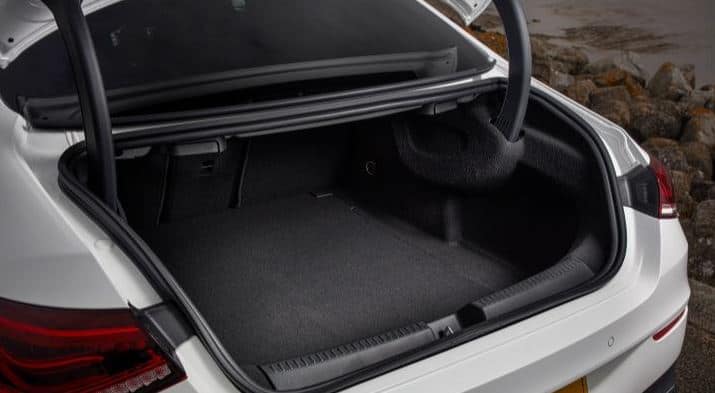
Some items are both heavy and bulky, caravan awnings being a good example.
In other cases, the items are not heavy, but they can definitely be bulky. An Aquaroll, Wastemaster or caravan step are good examples.
Therefore when trying to choose the best tow car to meet your needs, you need it not only to have enough volume to hold all of your belongings but you need to be able to actually get them in there.
As a general rule, you want to focus on estates and hatchbacks as the best tow car options as opposed to saloons.

If you need to add storage capacity to your tow car a roof box may be worth considering: Image – Amazon.co.uk
However, if have to choose a saloon as your tow car and internal storage space is an issue, you could obviously consider external storage.
A roof box such as the example above may provide you with some vital additional storage space.
A roof box can also help to take some load off the rear suspension of the tow car if you are getting close to the car’s noseweight limit.
While I’m on the topic, before you hitch up a caravan, you need to always check its noseweight.
If you exceed the nose weight limit of the car, that is also going to be a potentially illegal outfit and a breach of the terms of your insurance.
Best Tow Bar Options For Towing A Caravan
Whether you looking to buy a new or second-hand tow car for your caravan, you’re obviously going to need a tow bar/ball.
Its important to appreciate the different tow bar options found on tow cars, as some are more suited to towing caravans than others.
Furthermore, if you are purchasing a second-hand car that appears to have a tow bar fitted, check that it is actually suitable for towing. A tow bar that cannot tow?
Yes, a bit of an odd one, but don’t worry, I’ll explain what that’s about. I’ve got a post on the best tow bars which goes into more detail, below is just a summary.

Going the DIY route with a tow bar/ball installation is not advised unless you are sure you know exactly what you are doing and properly understand your cars 12V lighting circuit: Image – Amazon.co.uk
Fixed, Detachable & Retractable Tow Bars
Most cars today are still fitted with fixed towballs, either flange/bolted tow balls or swan neck towballs where the fixing is hidden behind the bumper.
However, detachable tow bars have steadily been growing in popularity over the last couple of decades.
The appeal being you can remove the tow ball when not required. Hence, the aesthetics of the car appear closer to its original state before it was modified for towing.
The final option is a retractable (manual or automatic) towball. Previously only found these on high-end Range Rovers etc.
However, they are now being offered on more affordable tow cars. For instance, I have a guest who had an electric automated retractable towball fitted by Ford when they purchased their new tow car.
As I’m sure you have guessed, the cheapest option is a fixed tow ball. Then the next most expensive is detachable, with the retractable option being the most expensive.
For the cheapest fixed tow ball options, you are looking at a couple of hundred pounds fitted.
When you are looking at automated retractable tow balls currently to get one fitted, you will be lucky for under a thousand pounds.
Presuming all of these tow ball options have been fitted correctly, there is no benefit in terms of towing performance, its purely an aesthetic choice.
However, having said that, as I discuss in my best towbars post, we have a fixed towball, and I do bang my shins against it loading the back of the car.
Hence, that’s an issue you don’t have with detachable or retractable tow bars. So the difference isn’t purely aesthetic and about how the car looks when its not towing.
Avoid Short Neck Towballs For Towing A Caravan
If you are purchasing a new or used/second-hand tow car with a swan neck, detachable or retractable towball, the issue of a short neck towball does not apply.
The issue of short-neck towballs is really just to do with tow cars fitted with flange/bolt-on towballs. The best/safest towball option for cars towing a modern caravan is a long/extended neck towball.
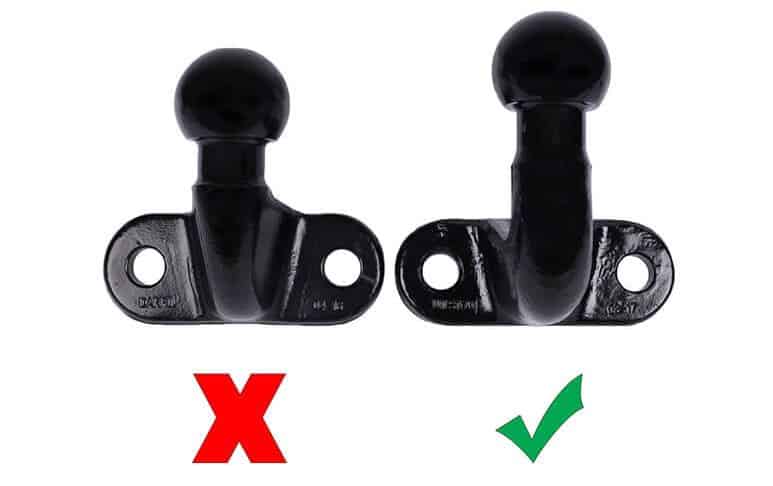
Why is a long/extended neck better for towing a modern caravan? Well, its to do with the stabiliser hitch head fitted to pretty much all caravans from the 2000s onwards.
There is a large clamping mechanism that engages plastic pads that grip the sides of the towball to provide additional stability when towing.
Well, with a short-neck towball, this clamping mechanism can foul (touch) the towball bracket. Hence, in some cases, its not actually possible to properly lower the stabiliser hitch handle.
If that’s the case, then the stabiliser hitch is not able to do its job, and the caravan will likely be less stable when towing.
Conclusions On The Best Cars For Towing A Caravan
For me personally, I think diesel engines in cars, if not currently a dead technology, is definitely dying.
I think the combined issues of modern diesel engines on short runs and the growth of low emission/Clean Air Zones going forward is going to reduce their appeal more and more.
As the owner of an old diesel tow car, while I love the high MPG and high torque for towing our caravan, that car is going to be banned from going to certain places in the future.
Furthermore, I do see the black particulates coming from that car under acceleration, and I genuinely feel guilty every time I see that.
I would love to say there is a range of affordable pure electric tow car options to choose from. However, that’s simply not the case, and I think we are quite a few years away from that the case.
Therefore, for quite a few years yet the best option is going to be petrol.
Within the coming years, there is going to be better petrol/plug-in hybrid options available, providing better MPGs and low-end torque ideal for towing a caravan.
They will also have around a 50-mile electric-only range. Therefore if the car is plugged in at home short runs to the shops/work etc, will be very cheap indeed.
I hope you found this post on what I think are the best tow car options currently and going forward for towing a caravan interesting/informative.
At some point, if I get the chance, I would like to write a post on the best petrol/hybrid tow cars available now and in the future.
As I think these will be the best option for quite a few years until pure electric tow cars are a viable option for most people.
Anyway, thanks for reading, and I hope at some point in the future you decide to come and visit us here at Horton Common caravan site. 🙂
Want To Visit Horton Common? – Book Here

